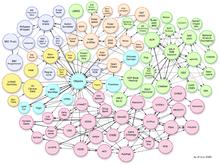What To Expect?
This is the fourteenth in the IWMW series of events, which was launched in July 1997 – just two months after the Labour party was elected into power. That now seems a very long time ago! People who have attended IWMW events over the years will be familiar with the format of this year’s event, but what can newcomers expect when they arrive at the University of Sheffield on 12 July?
Opportunities for those New to the Sector and to the Event
We might expect to see significant numbers of newcomers at this year’s event in light of the stories I have been hearing regarding the early retirements and redeployment of staff in some institutions. Those who are newly appointed in institutional Web teams and those who are new to the higher education sector should find that the variety of talks and sessions at the event will provide a useful way of both updating the set of skills needed by those involved in providing institutional Wb services and understanding how these skills can be used within the higher education context.
Newcomers should also find that the event can provide an opportunity to establish contacts with one’s peers within the community. Establishing an effective community of practice can be particularly valuable within the public sector, particularly in the context of the Web management community’s culture of openness and sharing. The workshop sessions will normally provide an opportunity for everyone to participate in the discussions. In addition if you feel that you would like to contribute to the event (perhaps, for example, there are areas of work you are particularly proud of which you would like to share with others) you will be able to put your name down to host a barcamp session.
 The social events will provide an opportunity for informal networking. On the first evening the workshop dinner will be held in the central dining room in the Edge at the University.
The social events will provide an opportunity for informal networking. On the first evening the workshop dinner will be held in the central dining room in the Edge at the University.
The following evening we are pleased to announce that there will be a drinks reception at the Kelham Island Museum. This museum houses the objects, pictures and archive material representing Sheffield’s industrial story. The drinks reception at the museum will begin at 19:00 and there will be plenty of time to explore the museum. Afterwards you will be free to visit local restaurants and bars before making your own way back to the University.
Still Relevant for the Seasoned IWMW Participant!
Those of you who have attended several of the IWMW events will be familiar with the format of the event. The programme for this year’s event, however, introduces some new areas. As indicated in the theme for this year’s event, “The Web In Turbulent Times“, we will explore the new challenges for institutional Web teams, who, after over a decade of growth, will now have to provide existing services (and still be expected to exploit new opportunities) in the context of reduced budgets and, possibly, reduced levels of funding. We will therefore be providing a number of plenary talks and workshop sessions related to the “Economic challenges“.
As in previous years we will also be providing updates on new developments which are of relevance to those providing institutional Web services. Areas to be addressed which will be of interest to many are Mobile Technologies, HTML5, the Social Web and Linked Data and RDFa, not forgetting, of course, the best practices for managing institutional Web services.
If you have attended previous events but haven’t given one of the plenary talks or facilitated a session you may wish to take the opportunity of giving an informal talk in one of the barcamp sessions.
An Opportunity to Participate
Over the past 5 years or so we have used the IWMW event as an opportunity to evaluate a variety of new Web technologies. Such experiments provide an opportunity to identify potential benefits in the context of a trusted environment – and also allow participants the opportunity to evaluate such technologies which may also be of interest for use locally.
This year we are building on the success of the IWMW 2009 blog. This year’s blog incorporates the BuddyPress plugin and so provides a social networking environment which can be used by participants. You may wish to use this in advance of the workshop, perhaps for discussing travel arrangements or other aspects related to a trip away to a conference. Workshop facilitators and speakers may also wish to use the environment to support their talks and sessions.
We hope all participants at this year’s event will make the most of the opportunities provided at this year’s event.

 The social events will provide an opportunity for informal networking. On the first evening the workshop dinner will be held in the central dining room in
The social events will provide an opportunity for informal networking. On the first evening the workshop dinner will be held in the central dining room in 



